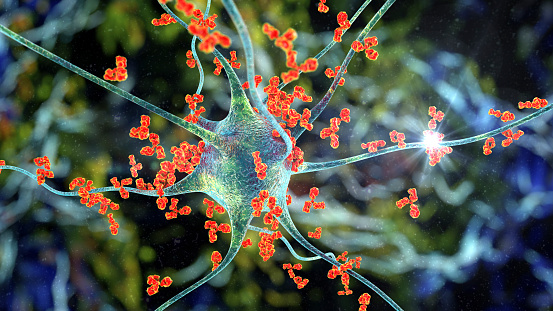
Blog
The Impact of Autoimmune Diseases on Fertility

Autoimmune diseases are certain conditions in which the body’s immune system attacks the healthy cells and tissues, perceiving them as foreign or abnormal. Instead of attacking any harmful foreign bodies, the immune system starts attacking healthy tissues by creating antibodies against them.
Having an autoimmune condition can be a big cause of infertility among women and men. This is because the immune system is critical for the optimal functioning of the body, including the reproductive organs. The immune system could be one of the causes of infertility due to its important participation during the process of embryo implantation in the uterus as well as the development of a pregnancy.
An autoimmune disease such as (lupus, rheumatoid arthritis, or Type I diabetes) generally increases your risk for infertility. Such conditions can also affect the ovaries, reducing the ovarian reserve or the number of remaining eggs in the ovaries. This can cause early menopause and infertility.
Women can have issues when it comes to the implantation of embryos. The normally-functioning immune system will perceive the embryo as a foreign body initially and that is why you see some women having severe morning sickness. But later, the mother’s immune system starts to protect the embryo from attack by other foreign bodies. This is not the case among women with autoimmune diseases. The immune system fails to recognize the embryo and starts attacking it, causing frequent miscarriages. This is why some women experience frequent miscarriages but we can not say or categorize such women as infertile.
A strong, balanced immune system is vital in pregnancy as it helps the uterus accept and nurture the embryo. Your immune system is responsible for triggering certain blood vessels necessary for creating and growing the placenta to facilitate the healthy development of your baby. In addition to increasing your risk for infection and disease, a weakened immune system may not be able to support a pregnancy.
Another way in which autoimmunity can affect the fetus is by passive transfer of an antibody that has pathogenic effects. Examples include neonatal thyrotoxicosis, neonatal lupus, and neonatal myasthenia gravis. All improve as the level of maternal antibody declines.
Women with SLE (system lupus erythematosus) ,a situation wherein the immune system attacks its own tissues (an inflammatory disease) need screening for particular antibodies which can cause fetal heart block and heart failure. Also, a man may have anti-sperm antibodies, these attack and destroy sperm, which can be a cause of fertility issues Thus, pregnancy does not occur.
If you are unable to conceive for a long time, and if you are struggling with infertility or recurrent miscarriage, you may need to be evaluated for some autoimmune diseases:
1. Thyroid disease: Autoimmune thyroid disease is common in women. We know that even mild thyroid disease can reduce pregnancy rates and increase miscarriage risk. Thyroid disease should be ruled out in all women with infertility.
2. Decreased ovarian reserve: All women who have infertility should have their ovarian reserve tested. Initially, two hormone levels will be evaluated – FSH (follicle stimulating hormone) and AMH (antimullerian hormone). If these levels are abnormal for your age, then you have diminished ovarian reserve which could have an autoimmune cause. Tests for other autoimmune diseases may need to be performed depending on the severity of your diminished ovarian reserve.
3. Antiphospholipid Antibody Syndrome (APLAS):Women with a history of recurrent miscarriage or placental abruption may need tested for Antiphospholipid Antibody Syndrome. This is an autoimmune disease in which antibodies are produced against one of the components of placental tissue, increasing the risk of blood clots within the placenta, and other pregnancy complications.
4. Rheumatoid arthritis.
5. Systemic lupus erythematosus.
6. Anti-sperm antibodies:Men can create antibodies to their own sperm which may reduce the sperm’s motility and/or ability to fertilize an egg. These antibodies are typically found in men with a history of significant testicular trauma or testicular surgery such as vasectomy, vasectomy reversal, or varicolored repair.
How Immune Problems in Infertility Are Treated?
It depends on the case and type of disorder. If you are diagnosed with an autoimmune disease, treatment of the specific disease should be started, sometimes getting the autoimmune disease under control can improve fertility. In other situations, additional fertility treatment may be required to improve the chance of pregnancy and/or lower the risk of miscarriage. Controlling the symptoms of autoimmune diseases can increase the chances of successful pregnancies.
For those who aren’t aware of any immune problems, yet are experiencing infertility or recurrent miscarriage, a diagnosis is made after testing. Testing for immune problems in infertility isn’t routine and usually occurs only in cases of recurrent loss of pregnancy, or multiple failed rounds of IVF in which the embryos have been found to be viable and of good quality but pregnancy does not result. In the case of true unexplained infertility, the woman will also need to test for immune disorders.
Treatment for infertility related to immune disorders is not a one-size-fits-all proposition and will be tailored to suit the woman’s specific needs. In most cases, IVF and closely monitoring the pregnancy will result in a successful outcome.
That is why in my video on social media yesterday i emphasized that there is nothing like unexplained infertility because alot of Gynea do not do proper diagnosis on their patients. When a woman is having a recurrent miscarriage, and she is not having infection, the endometrium is ok, uterus size is ok, there is a need for the gene to be checked. This is by getting to know if both couples does not have antibodies (antisperm) . We discussed this briefly last week, those who followed my post last week can now understand the in depth knowledge of the genetic disorders i was trying to make them understand.
So if you keep having recurring miscarriages, please go and run antinuclear antibody (ANA) , Immunofluorescence assay (IFA) screening test to be sure of not having an autoimmune disease before you go for an IVF or get pregnant again to avoid losing the baby.
We have a partner in Liberia who is Nutrigenomics specialist, we will co-manage your autoimmune disease together to ensure you carry your pregnancy till term if you have checked and an auto immune diseases is diagnosed.



I was very pleased to uncover this web site. I want to to thank you for your time due to this fantastic read!! I definitely appreciated every bit of it and I have you bookmarked to look at new things on your website.